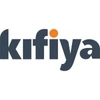Kifiya Financial Technology
Kifiya Financial Technologies Plc, a digital financial solutions in Ethiopia and our key partner in building a robust e-commerce ecosystem that empowers MSMEs and creates jobs.

Latest from Kifiya Financial Technology
-
The Mastercard Foundation And Kifiya Financial Technology Honour Over 100 Graduates Of SAFEE Program, Specializing In AI And Data Science
-
Mastercard Foundation and Kifiya Financial Technology PLC to Enable More Than 477,800 MSMEs to Access Uncollateralized Digital Credit Products
-
Mastercard Foundation commits USD 3.2 million to Rescue Enterprises Through Production Repurposing to respond to COVID-19 in Ethiopia
-
10 Million Young People to Access Dignified and Fulfilling Work Opportunities in Ethiopia




